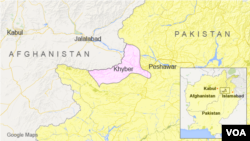A group of heavily armed militants launched coordinated attacks Friday on three Pakistan military posts near the border with Afghanistan, reportedly killing several security personnel and wounding many more.
The military’s media wing, Inter-Services Public Relations, reported hours later that the predawn raid took place in the volatile border district of Khyber. It resulted in the deaths of at least three soldiers, while the ensuing clashes killed four assailants.
The statement did not share further details, but multiple security sources in the battle zone reported that more than a dozen Pakistani soldiers were also wounded.
Militants tied to an outlawed entity known as the Hafiz Gul Bahadur group claimed responsibility for the attack in a social media post.
The group has stated publicly that its fighters are waging insurgent attacks in coordination with the globally designated terrorist organization Tehrik-i-Taliban Pakistan, or TTP.
Militancy-hit Khyber and surrounding border districts often encounter deadly attacks aimed at Pakistani security forces and their facilities.
Pakistan complains that the TTP and leaders of other antistate groups have taken shelter in Afghanistan after fleeing counterinsurgency operations and orchestrated cross border attacks from sanctuaries there.
The violence has intensified and killed hundreds of Pakistanis, mostly security forces, since the Taliban reclaimed control of Afghanistan three years ago.
The de facto Taliban government denies the presence of foreign militants in the country, insisting that it does not allow anyone to threaten other countries, including Pakistan, from Afghan soil.
The United Nations has backed Pakistani assertions, noting in its latest situation report that the TTP is “the largest terrorist group” in Afghanistan and receives growing support from the ruling Taliban to launch cross-border attacks.
The report, released last month, estimates that up to 6,500 TTP militants, including Afghan fighters, are operating in Afghanistan and being trained as well as armed at al-Qaida-run camps there.
U.N. officials have repeatedly warned about the threat of terrorism emanating from Afghanistan, identifying Islamic State Khorasan, or IS-K, an Afghan offshoot of Islamic State, as the most serious regional threat.
The head of the U.N. counterterrorism office told a Security Council meeting on Thursday that IS-Khorasan has intensified its recruitment efforts in Afghanistan and that there is a risk of the group carrying out attacks abroad.
“ISIL-K has improved its financial and logistical capabilities in the past six months, including by tapping into Afghan and Central Asian diasporas for support,” Vladimir Voronkov said, referring to the terror organization by an acronym.
Zabihullah Mujahid, the Taliban’s chief spokesperson, responded to the U.N. assessments late Friday, dismissing them as “unfounded and driven by propaganda.”
He reiterated in a statement posted on X, formerly known as Twitter, that sustained counterterrorism operations by Taliban security forces have “significantly weakened” IS-K in Afghanistan.
He said the Taliban government does not allow anyone to use Afghan soil to threaten other countries and claimed that “the entire territory of Afghanistan remains firmly” under their control, leaving no room for external groups to operate.
“Despite the prevailing security, stability and robust presence of security forces in Afghanistan, any expressed apprehensions regarding the presence and activities of ISIS or other groups constitute a campaign that should be halted to prevent the manipulation and distortion of public perception,” Mujahid said.






